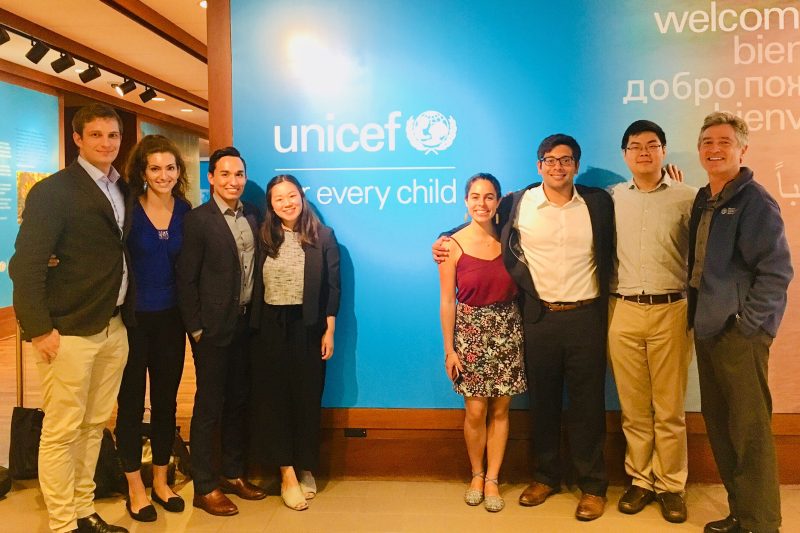This fall, Global Affairs seniors in the Jackson Institute have been working with NGOs and organizations across the world to apply their knowledge from Yale to solving global problems.
One capstone group has been making an impact on international health through a partnership with UNICEF. Yale College seniors Phil Abraham, Sofia Braunstein, Eric Duan, Nikolaj Hoejer, Kyle Ranieri, Lauren Sapienza, Grace Shu, Matthew Stock, and Andrew Weiss worked with UNICEF’s Supply Division to advise on pandemic response — analyzing vaccine supply strategies, strengthening local healthcare systems, and learning from past and present UN program leaders.
Under the direction of Jackson Institute faculty member Robert Hecht, these Global Affairs students have researched vaccine supply management and the creation of sustainable health infrastructure in the developing world. The capstone group also interviewed leaders in the field of global health to refine the students’ ideas and hear from professionals about the future of the field.
At the end of the semester, students delivered a report to UNICEF outlining their suggestions on vaccines and public health management. Jackson undergraduates see the capstone as a critical part of the major. “Being able to spend a semester working alongside peers to present strategic recommendations to an organization like UNICEF is an opportunity unique to Jackson and one of which I’m grateful to be a part,” said Shu.
UNICEF is one of six capstone clients that Jackson undergraduates worked with this fall. “One of the biggest draws for me personally when selecting the Global Affairs major was the senior capstone,” said Shu. “The process has been incredibly collaborative, and our brainstorming sessions with our advisor in particular have yielded some of the most fruitful discussion I’ve had during a class at Yale,” Shu added.
The UNICEF group members say they have enjoyed and learned from the capstone experience. “Whether through interviews with former UN agency heads or through client meetings at the UNICEF headquarters, this project has been intellectually engaging and tangibly impactful,” said Ranieri.
Members of the UNICEF capstone will get to see their ideas change the way that international NGOs source and supply vaccines — as well as the benefits of how UNICEF works beyond the scope of their project. “It’s been great learning about UNICEF’s commitment to sustainable development of low and middle-income countries’ local capacity with respect to strengthening healthcare systems … On a broader scale, it has been eye-opening to see how complex global health is from the international perspective down to the vaccine development pipeline,” Duan said.
The capstone students see their work as an opportunity that lasts beyond their time at Yale. “I’ve also learned hard skills of data analysis and soft skills of client relations — these will surely carry over to my career after graduation and beyond,” Ranieri added.
The client, Gian Gandhi, Chief of UNICEF Supply Division’s Markets, Supplier Financing and Innovation Centre, reflected on his partnership with the Yale students:
“The students approached the project with an adeptness I would expect of professional consultants for hire, providing an inception report to structure their work, a face to face mid-project readout, and an end of project presentation. They set up their team with clear roles and responsibilities, and set up mini-teams that tackled a variety of aspects of the issue in parallel. This enabled them to cover a lot of ground, and yet dig deeply into complex issues. As a client to the Capstone students, we were grateful for their hands-on engagement, their rigor, the way they structured the work, as well as their timely, and clear communications throughout the project. Also, of note, the students gained access to an impressive array of senior actors in the field of global health whose opinions and input UNICEF values. They also drew upon the limited but often technically nuanced grey and published literature to inform their advice. The students also listened to the input UNICEF provided along the way, and modified their thinking and approach to continually focus their efforts to meet our evolving needs.”
“In terms of the nature and substance of their work, they explored the issues in-depth, to the point that it felt like we were talking with peers that had worked in the arena of vaccine development and delivery for years, and understood the nuances and complexities associated with the various institutional mandates of key agencies in the field. The resultant report they have provided is of a high standard—and one that we have shared across the relevant team members across several HQ Divisions at UNICEF. Many of their recommendations align with emerging thinking within UNICEF, and as such, have served to validate the approaches we are starting to consider. Other recommendations that the students provided have offered UNICEF new ideas that are ambitious and inventive. A sign of the quality of their work is that UNICEF has requested that the Capstone students present again their final findings and recommendations to a larger audience of UNICEF staff in the new year (2018) to discuss how UNICEF might be able to adopt and adapt to some of the students proposals.”
Learn more about this year’s capstone projects
